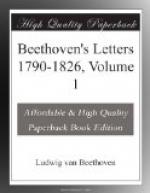I shall be glad, right glad, to play. I send you the violoncello part; if you find that you can manage it, play it yourself, or let old Kraft[1] do so. I will tell you about the lodging when we meet.
Your friend,
BEETHOVEN.
[Footnote 1: Anton Kraft (and likewise his son, Nicolaus Kraft) was a most admirable violoncello-player, with whom Beethoven from the earliest days of his residence in Vienna had played a great deal at Prince Lichnowsky’s. Kraft was at that time in Prince Lobkowitz’s band.]
58.
TO ZMESKALL.[1]
May 14, 1809.
MY DEAR LITTLE MUSICAL OLD COUNT!—
I think after all it would be advisable to let old Kraft play, as the trios are to be heard for the first time (in society), and you can play them afterwards; but I leave it all to your own option. If you meet with any difficulties, one of which may possibly be that Kraft and S. [Schuppanzigh] do not harmonize well together, then Herr v. Zmeskall must distinguish himself, not as a mere musical Count, but as an energetic musician.
Your friend,
BEETHOVEN.
[Footnote 1: Kraft and Schuppanzigh were then each giving quartet soirees.]
59.
TO FREIHERR V. HAMMER-PURGSTALL.[1]
1809.
I feel almost ashamed of your complaisance and kindness in permitting me to see the MS. of your as yet unknown literary treasures. Pray receive my sincere thanks. I also beg to return both your operettas. Wholly engrossed by my professional avocations, it is impossible for me to give an opinion, especially with regard to the Indian Operetta; as soon as time permits, I will call on you for the purpose of discussing this subject, and also the Oratorio of “The Deluge.” Pray always include me among the warm admirers of your great talents.
I am, sir, with sincere esteem, your obedient
BEETHOVEN.
[Footnote 1: I see in Schindler’s Beethoven, that he wished to have “an Indian Chorus of a religious character” from this renowned Orientalist, who, in sending his Persian Operetta, written “rather with an ideal than a musical object,” and likewise an oratorio, The Deluge, remarks:—“Should you not find these works in all respects executed quite to your taste, still I feel convinced that through the genius of a Beethoven alone can music portray the rising of the great flood and the pacifying of the surging waters.”]
60.
TO FREIHERR V. HAMMER-PURGSTALL.[1]
1809.
Forgive me, my dear H——, for not having brought you the letter for Paris. I have been, and still am, so much occupied, that day after day I am obliged to delay writing it, but you shall have it to-morrow, even if I am unable to come myself to see you, which I am most anxious to do.




